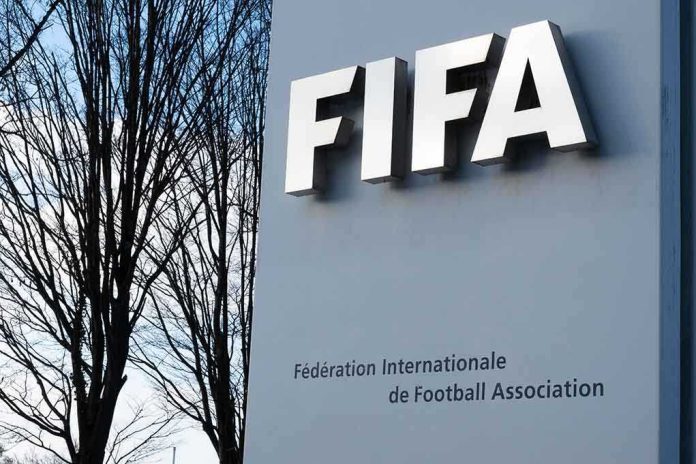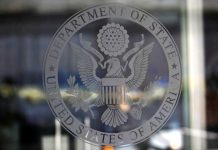
Imagine a world where the most controversial American president just made it easier for millions of soccer fans, yes, even from rival nations, to breeze through the U.S. border during the largest sporting event on earth, all while warning cities they could lose their time in the global spotlight if they can’t guarantee safety.
Story Overview
- Trump unveils the unprecedented ‘FIFA Pass’ visa system, fast-tracking interviews for 2026 World Cup ticket holders.
- This policy is set against a backdrop of trade tensions with Canada and Mexico, America’s World Cup co-hosts.
- Security threats loom as Trump warns host cities—shape up or lose your matches.
- The move tests the balance between national security, global goodwill, and America’s image as event host.
Trump’s FIFA Pass: Opening the Gates—But Only for the Chosen Ones
November 2025. The world’s eyes are fixed on America—not for another election or diplomatic standoff, but for a soccer tournament poised to shatter attendance records. President Trump’s announcement of the FIFA Pass system lands with a thud and a cheer: international fans with a ticket get to skip the back of the visa queue. The move is unprecedented for a U.S. sporting event and instantly triggers both celebration abroad and grumbling at home. “Safety and security is the number one priority,” Trump insists, even as he boasts, “We’re moving them up in the queue.” Critics see a political flex, supporters see a pragmatic fix—either way, the doors are opening, but not for everyone.
America’s notoriously strict visa process, shaped by decades of security concerns, rarely bends. But with millions expected to descend on U.S. soil, the administration faced a logistical nightmare. The FIFA Pass links visa prioritization directly to ticket sales, merging global sport with national security in a way that’s never been tried here. The Department of State, long used to sticking to its vetting guns, now must coordinate with FIFA, ensuring only legitimate ticket holders benefit. The rest? They wait as usual, fueling debates over fairness and favoritism.
Diplomatic Jitters: Co-hosts, Trade Wars, and the Threat of Losing the Spotlight
With the U.S., Canada, and Mexico jointly hosting the Cup, you would expect Olympic-level camaraderie. Instead, the FIFA Pass announcement lands squarely in the middle of a simmering trade dispute. The co-hosts grumble; American policy, as always, takes center stage. Trump’s pointed threats to strip host cities of matches if they falter on security only add fuel to a diplomatic fire. Cities like Seattle find themselves in the crosshairs, forced to reassure the world they’re up to the task or risk losing the economic hurricane the Cup brings.
The diplomatic dance doesn’t stop at the border. Ticket holders in Canada and Mexico—supposedly America’s partners—face the same U.S. scrutiny as everyone else. Behind closed doors, officials wrangle over logistics, sovereignty, and who gets to call the shots. The FIFA Pass is both a carrot and a stick, rewarding some, warning others. As the tournament draw in Washington, DC approaches, the tension is as thick as the anticipation.
Security, Speed, and the Shadow of Precedent
Trump’s administration insists the new system doesn’t lower vetting standards. Instead, it’s all about speed—moving legitimate fans to the front of the line without skipping the background checks. Immigration experts cautiously agree: the core vetting remains, but the process accelerates for those who can prove their investment in the event. The model mirrors temporary waivers seen at Olympics abroad but marks a first for the U.S.—and sets a precedent that could outlive the tournament itself.
Critics worry the prioritization could open doors for bad actors, or worse, create a new class system at the border. Supporters argue it’s good business and good diplomacy: more fans, more spending, more global goodwill. But with Trump’s public threats to yank games from “unsafe” cities, the conversation never strays far from the undercurrent of security. Every mayor with a match on the schedule knows the world—and Washington—is watching.
Economic Boon or Political Time Bomb? The Stakes for America’s Global Reputation
For millions of fans, the FIFA Pass is a golden ticket, promising streamlined travel and a once-in-a-lifetime experience. For U.S. cities, it’s a shot at economic windfall—hotels, restaurants, and merchants ready for the world’s biggest party. Yet the stakes are higher than ticket sales. America’s ability to host, secure, and welcome the world will define its reputation for decades to come. Diplomatic rifts with co-hosts, social tensions over immigration, and political debates over executive authority swirl in the background, threatening to overshadow the spectacle.
The real wildcard? Whether this experiment in event-linked immigration policy becomes a template for future global gatherings—or a cautionary tale. As the countdown to kickoff ticks on, one truth is certain: the world is coming, and the world is watching how America opens its doors—and who it lets inside.
Sources:
Politico: Trump to prioritize visas for World Cup ticket holders









